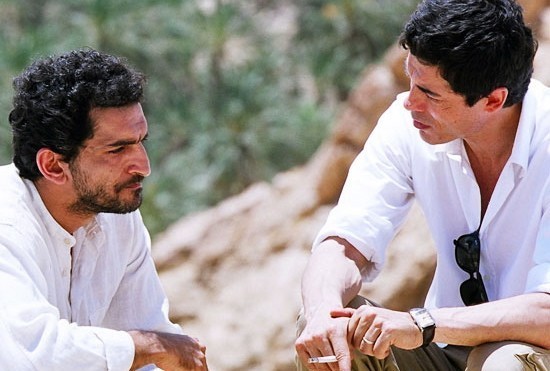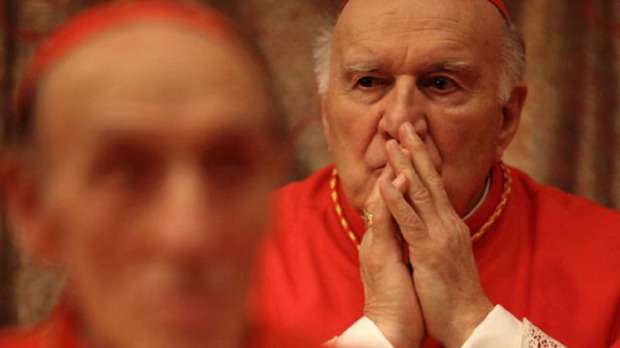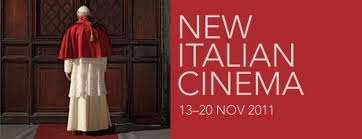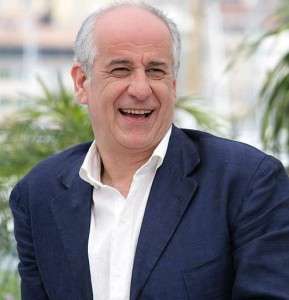-
RICKY TOGNOZZI: THE FATHER AND THE FOREIGNER (2010)

AMR WAKED AND ALESSANDRO GASSMAN IN THE FATHER AND THE FOREIGNER
Male bonding goes awry
From Ricky Tognazzi, prolific son of famous Italian film actor Ugo Tognazzt (who won the Best Actor award at Cannes in 1981), comes this movie about male bonding and handicapped children that for some reason morphs into a halfhearted stab at a crime thriller, or at least that's how the genre-mixing feels in this too-many-cooks adaptation of a novel by Giancarlo De Cataldo (Einaudi, 1997); another of De Cataldo's novels was the basis for Michele Placido's 2005 directing debut, Romanzo criminale. Tognazzi has been good before at handling male friendship, but the botched screenplay buries that skill. Like his father, Ricky Tognazzi has done more acting than directing, and this is the first feature he's directed in seven years. De Cataldo collaborated on the screenplay; it hasn't helped much.
Here, the handsome, troubled-looking Alessandro Gassman again plays a man attracted by the Near East, as he did fourteen years ago in Ferzan Özpetek's debut Steam: The Turkish Bath (1997). This time it's a warm-hearted Syrian Arab man called Walid (Amr Waked), apparently some sort of businessman, who draws him in and impresses with a deep love and compassion for his handicapped baby that Diego (Gassman) can't muster for his own disabled son. The two men meet by sharing a smoke at a center where their children are being treated and Walid's selfless love for his child is later evident. ( Later, they share intimate secrets in a steam bath, recalling scenes in Pamuk's film, but without the homoerotic element.) Diego, a fidgety government functionary, is uneasy around his child Giacomino (Leonardo Della Bianca) and jealous about the way his wife Lisa (Kseniya Rappoport) achieves moral superiority by monopolizing their son's care. She soothes and adores the child, while Diego sits in another room feeling uneasy glancing in a document his new friend Walid has unintentionally dropped in the courtyard where the met.
The connection between the two men linked by their handicapped sons is strongly established (too bad it fades later as the focus shifts). Within twenty minutes it's also established that the charming, friendly, and much calmer Walid's involved in fishy business. Walid tools around in a small chaufeured Audi, and sends an Arab babe called Zaira (Lebanese director Nadine Labaki) to sweep Diego off on an unscheduled trip to the Middle East. Diego gets willingly dragged off by his super-rich friend to various exotic and mysterious affairs and celebrations. Tognozzi does his exotic orientalist mumbo-jumbo well enough. It's all mysterious. Eventually Walid, who isn't really Walid, vanishes into thin air, and the authorities come to Diego for help in finding him.
But through all this, as the interesting parents of handicapped children drama gets swept off and turned into a fancy photo exhibit by Diego's wife Lisa, it all becomes a muddle. The filmmakers in adopting this novel needed to do some juggling that involves keeping some very different balls in the air, and it fails. As one Italian reviewer wrote, it's as if there were trying to meld Gianni Amelio's The Keys to the House with Tony Scott's Enemy of the State. I like Gassman here. He's a little like Joseph Cotton in The Third Man, the good chap drawn into malfeasance he can't understand, but sterling and able to stand his ground. Graham Greene might have whipped this screenplay into shape. Unfortunately he wasn't available.
This film seems a throwback to the days when all Italian movies were dubbed. You can see lips moving out of sink, especially in the case of Amr Waked. Waked, who is well known in his native Egypt and appeared in Yousry Nasrallah's Felliniesque The Aquarium (SSIFF 2008), and deserves better. So does everybody in this polished production with its handsome use of both Italian and Middle Eastern locations.
Written by Ricky Tognazzi, Giancarlo De Cataldo, Simona Izzo, Graziano Diana. Cinematography by John Canevari. Editor: Carla Simoncelli. Set Design: Mariangela Capuano. 110 min. Released in Italy February 18, 2010. Screened for this review as part of the San Francisco Film Society's New Italian Cinema series presented at the Landmark Embarcadero Cinema Nov. 13-20, 2011. This was the film's North American premiere.
Last edited by Chris Knipp; 08-03-2014 at 02:12 AM.
-
This appeared over a month earlier in a Paris movies thread.
NANNI MORETTI: HABEMUS PAPAM (2011)

MICHEL PICCOLI IN HABEMUS PAPAM
Lord, I am not worthy
Mike D'Angelo's Cannes AV Club report (as often happens) got it right: Nanni Moretti's new Habemus Papam is "slight but amusing, and often oddly touching." There is charm and something thought-provoking about this film, but those expecting some strong anti-papal satire will be disappointed. The title is what they declare at the Vatican (Latin for "We have a Pope") when a new Supreme Pontiff has been elected by the College of Cardinals. And the slim tale, in full Vatican dress, concerns a new His Holiness (Michel Piccoli) who feels too unworthy and can't go out to the balcony and face the faithful. Moretti himself plays a psychiatrist called in to figure out what's going on, who, when the electee escapes and wanders around Rome, becomes an activities leader for the cardinals focused on a volleyball tournament. As anybody will tell you, not just Mike, it's Piccoli who makes this "oddly touching," and even more. Piccoli is an immense yet modest presence, sad, timid, sweet, and wishing he'd become an actor. About that, he need not worry. Piccoli again proves that he's one of the great ones.
The spectacle of the men in red lined up and voting is impressive indeed, sequestered in a convincing mock-up of the Sistine Chapel at CineCittŕ, but it's hardly what you'd call exciting. The title means "We Have a Pope," or as D'Angelo more colloquially translates it, "We got us a pope." They don't have one at first. There are a series of votes, with the traditional puffs of black smoke sent up to tell spectators outside they have not succeeded, till finally votes (thought this isn't explained) are switched to a neutral candidate from competing favorites and Cardinal Melville (Piccoli) wins and shyly smiles in acceptance, or just unwillingness to protest. When he refuses to publicly announce his own election, however, the Vatican cannot report it to the press, or anyone. They put a fat Swiss guard in the pope's rooms with instructions to walk back and forth and cast a shadow on the curtains now and then so people think the new pope is there. And that's when shrink Moretti and later Margherita Buy are called in to talk to the reluctant cardinal.
It's true I suppose as D'Angelo says that at first it seems Moretti "will be the Geoffrey Rush to Piccoli’s Colin Firth," but both the charm and the weakness of the film is that nothing is going to happen. When the female shrink comes in (Buy) and the cardinal loosens up a bit and admits he always wanted to be an actor, this is when things begin to click. The film becomes a kind of loosely-slung parable about responsibility and facades and role-playing. There's much ado from Vatincan front men (particularly one energetically played by Jerzy Stuhr), who keep the balls in the air, when really nothing is happening.
In the end Moretti's improvisational screenplay doesn't do what it could either with the drama of the narrative or the implications of the situation. Given the total control in the Vatican, it's implausible that the cardinal could be moved out to see the female shrink (comically cast as Moretti's character's ex-wife), and more implausible still that he could wind up wandering around and enter a theater with a troupe of actors rehearsing Chekhov's The Seagull, which he just happens to know by heart. Perhaps Moretti should have left this kind of thing to Rivette.
The sets and f/x and costumes work well to make the predeedings seem actually to be transpiring at the Vatican. The casting is fine. But you watch this because it's a great role for Piccoli, not for many other reasons. This is just a narrow conceit, floated out and allowed mostly to drift.
Habemus Papam was released in Italy in April, shown at Cannes in May, and subsequently at a number of international festivals. It opened in France September 7 and opens in the UK December 2, 2011. Screened for this review at MK2 Hautefeuille, Paris, on October 18, 2011.
-

Some comments on the San Francisco Film Society's New Italian Cinema Event, 2011 edition.
This was a very enjoyable series to watch, for me, and full of relevant stuff. The selections included many films that dealt with contemporary issues and there was no dead wood, nothing that was self indulgent or an obvious misfire. That quality of relevance was present even in some of the more problematic choices. 20 Cigarettes (though it got several Italian film awards this year) is very uneven in tone but it does deal with the Iraq war. The Father and the Foreigner winds up being rather muddled but it does touch on handicapped children and the Middle East. The ax-to-grind comedy Some Say No might be accused of trivializing the huge issue of Italy's national dependence on graft and favoritism, but maybe its sugaring of a bitter pill is strategically wise. Anyway, the issue it exposes is definitely a central one.
Our Life; One Life, Maybe Two; even the Fifties-set First Assignment focus on work problems. Our Life again confronts Italian graft and nepotism, on the working class level, as well las the plight of foreign workers. The issue is present in Some Say No, which asserts that the best qualified can't get the jobs they deserve. A very young man is wondering what to do in Francesco Falaschi's lightweight but charming This World Is for You, which considers the more basic and universal issue of someone whose artistic ambitions are deemed impractical.
Graft, the mafia, nepotism, joblessness, immigrant problems, and other issues were much in evidence, but there was no Il Divo or Gomorrah. Were those powerful, distinguished new Italian films just flukes, 2009 a fluke year? The Jewel, which, with names changed, describes the scandalous Parmalat bankruptcy, lacks the kind of acid wit, fast pace, and economy you get in films like The Social Network or In the Loop. The Jewel gets sidetracked too often, and since the director Andrea Molaioli's The Girl by the Lake (though it got a raft of Donatello awards in Italy) rambles too much, you wonder if Molaioli really knows how to tell a story. One can almost say that of Matteo Garrone's Gomorrah, but his Neopolitan gangster epic is energized by its rage. There was not much rage in evidence this year, not the kind of boldness one finds in Latin American films.
There was instead an epic timidity -- exhibited in the adorable performance of the splendid Michel Piccoli playing a shy Pope-elect who runs away from the prospect of ruling the Vatican in Nanni Moretti's droll but toothless Habemus Papam. As there was no rage there also was no real jewel in the series, not even a "little jewel," the actual title of that movie about Parmalat, Il gioiellino. It's difficult to pick a winner -- nothing emerged of the caliber of The Double Hour, the terrific character-driven, and mind-boggling, noir thriller-plus-romance by newcomer Giuseppe Capotondi, the standout from last year's series, which got a US run.
The series audience's City of Florence Award vote for Claudia Cupellini's bland directorial debut The First Assignment, a nostalgia piece about a schoolteacher in Puglia, was hard to figure (despite its positive reception at Venice last year). For me it would be hard to choose a best film. It was a pleasure just to watch the brilliant Toni Servillo at work again in two leading roles, both as a crabby executive in the true-to-life scandal movie, The Jewel, and as a man living under cover in the subtle mafia thriller, A Quiet Life.
Some high profile items were missing. We didn't get to see Italy's 2012 Best Foreign Oscar entry, Emanuele Crialese's Terraferma. True, Jay Weissberg of Variety, who saw it at Toronto, wrote that it's just a well-made film with "no crying need to be at a major film festival," but it would be nice to know about it. I also was hoping to see Saverio Costanzo's The Solitude of Prime Numbers, which was made from Paolo Giordano's bestseller and features Isabella Rossellini. That one was included in New York's summer version of this series, Open Roads. The June Lincoln Center series typically included more new films (15), with only two overlaps, 20 Cigarettes and The First Assignment. Prime Numbers got a raft of best acreess nominations for one of Italy's hot actresses, Alba Rohrwacher. The source novel by Paolo Giordano has been much read both in Italy and the US.
Speaking of Rohrwachers, Alba's sister Alice's directorial debut Corpo Celeste trumps anything shown here. It is another film that could be seen at Lincoln Center this year, not in the Italian series in June but with the high honor of being chosen as one of the 28 official selections of the New York Film Festival.
Italian cinema today, which is widely acknowledged to be sadly declined from its glory days, excels at chronicling generations, which is what you get with Muccino's early films and Marco Tullio Giordana's The Best of Youth. Daniele Luchetti (honored with a tiny retrospective) is taking stabs at this activity in his energetic but rather hasty new film Our Life (Best Film and Best Actor awards in Italy this year), and so is Alessandro Aronadio in his sliding-doors fantasy, One Life, Maybe Two.
What do we have to look forward to? Muccino, superficial perhaps but an accurate chronicler of his (Roman) generation, has defected to Hollywood too long perhaps. But Matteo Garrone seems to grow with each film, and he has a new one coming called simply Big House, that is , reputedly, an examination of the Italian TV industry. For me Gianni Amelio is one of the real living Italian masters. Since the touching Keys to the House, Amelio has made two films. The Missing Star (2006), debuted at Venice, not seen here, sounds dubious. But his 2011 film, The First Man (which debuted at Toronto this year), based on Camus' unfinished autobiographical novel about returning to Algeria, won the Fipresci Prize, and despite one critic's writing that it's "excessively subdued" -- Amelio may have yet to return to the power of his best work -- it surely is beautifully crafted (even if it's in French).

THE AMAZING TONI SERVILLO.
Last edited by Chris Knipp; 11-30-2011 at 08:04 PM.
 Posting Permissions
Posting Permissions
- You may not post new threads
- You may not post replies
- You may not post attachments
- You may not edit your posts
-
Forum Rules





 Reply With Quote
Reply With Quote



Bookmarks